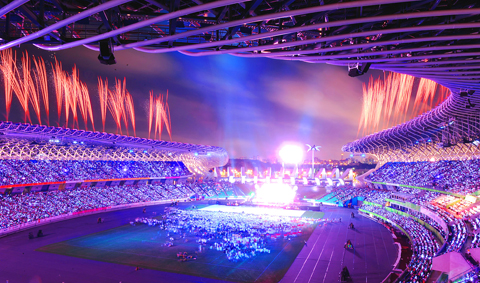Kaohsiung rounded off a successful World Games yesterday evening with a carnival-like closing ceremony that brought down the curtain on 10 days of exciting sporting competition.
The ceremony got underway at 7.30pm with spectators creating a sparkling “river of stars,” as the lights were dimmed before the 40,000-strong crowd simultaneously switched on LEDs.
The United Armed Forces Orchestra then entered to perform three marching tunes before the athletes took center stage with a parade.

PHOTO: CHANG CHUNG-YI, TAIPEI TIMES
As with the opening ceremony, China’s athletes failed to show in line with their announcement earlier this week that they would return home following the end of their competitions.
But nobody in the crowd seemed to care as they were too busy enjoying themselves.
Singer Bobby Chen (陳昇), then entertained the crowd with a couple of numbers before the main show got underway.
The show featured 10 colorful themed dance and visual performances with titles such as “Sound of the Sea,” “Dreams of the Butterfly Fish” and “Kaohsiung in Style” designed to showcase the history, culture, development and maritime roots of the host city.
Then, more than 100 traditional sky lanterns were released into the air to wish the athletes good fortune before International World Games Association president Ron Froehlich and Kaoshiung Mayor Chen Chu (陳菊) addressed the crowd.
Froehlich called the Games the “best ever” before Chen Chu, speaking in Mandarin and Hoklo, said the World Games would “be engraved into the hearts of Kaohsiung residents.”
Chen Chu also paid tribute to the thousands of volunteers who had “helped make the Games such a success,” before calling for Taiwanese to “fight in unity for the dignity of our country.”
She finished off by asking everyone to help make September’s Deaflympics in Taipei a success and “polish the brilliance of Taiwan in the international arena.”
The handover of the World Games flags came next as triple-gold-medal-winning speed roller skater Huang Yu-ting, Chen and Froehlich passed the flag to a representative of the city that will host the next games in four years time, Cali, Colombia.
Chen Chu then announced that the games were closed before local rocker Wu Bai (伍佰) and his band entertained the packed stadium with a medley of his best-known hits.
The evening and the Games then ended as they had begun, with a spectacular display of fireworks.
Earlier in the day, Taiwan’s athletes had added the icing to the cake on a successful final day as they picked up two golds, three silvers and a bronze.
The medals meant that Taiwan finished seventh in the final medal table with eight golds, nine silvers and seven bronze medals.
The 10 days of competition saw more than 4,000 athletes from 105 countries and territories compete for 186 gold medals.
Also See: Taiwanese finish Games with a flourish

CHAOS: Iranians took to the streets playing celebratory music after reports of Khamenei’s death on Saturday, while mourners also gathered in Tehran yesterday Iranian Supreme Leader Ayatollah Ali Khamenei was killed in a major attack on Iran launched by Israel and the US, throwing the future of the Islamic republic into doubt and raising the risk of regional instability. Iranian state television and the state-run IRNA news agency announced the 86-year-old’s death early yesterday. US President Donald Trump said it gave Iranians their “greatest chance” to “take back” their country. The announcements came after a joint US and Israeli aerial bombardment that targeted Iranian military and governmental sites. Trump said the “heavy and pinpoint bombing” would continue through the week or as long

TRUST: The KMT said it respected the US’ timing and considerations, and hoped it would continue to honor its commitments to helping Taiwan bolster its defenses and deterrence US President Donald Trump is delaying a multibillion-dollar arms sale to Taiwan to ensure his visit to Beijing is successful, a New York Times report said. The weapons sales package has stalled in the US Department of State, the report said, citing US officials it did not identify. The White House has told agencies not to push forward ahead of Trump’s meeting with Chinese President Xi Jinping (習近平), it said. The two last month held a phone call to discuss trade and geopolitical flashpoints ahead of the summit. Xi raised the Taiwan issue and urged the US to handle arms sales to

State-run CPC Corp, Taiwan (CPC, 台灣中油) yesterday said that it had confirmed on Saturday night with its liquefied natural gas (LNG) and crude oil suppliers that shipments are proceeding as scheduled and that domestic supplies remain unaffected. The CPC yesterday announced the gasoline and diesel prices will rise by NT$0.2 and NT$0.4 per liter, respectively, starting Monday, citing Middle East tensions and blizzards in the eastern United States. CPC also iterated it has been reducing the proportion of crude oil imports from the Middle East and diversifying its supply sources in the past few years in response to geopolitical risks, expanding

Pro-democracy media tycoon Jimmy Lai’s (黎智英) fraud conviction and prison sentence were yesterday overturned by a Hong Kong court, in a surprise legal decision that comes soon after Lai was jailed for 20 years on a separate national security charge. Judges Jeremy Poon (潘兆初), Anthea Pang (彭寶琴) and Derek Pang (彭偉昌) said in the judgement that they allowed the appeal from Lai, and another defendant in the case, to proceed, as a lower court judge had “erred.” “The Court of Appeal gave them leave to appeal against their conviction, allowed their appeals, quashed the convictions and set aside the sentences,” the judges